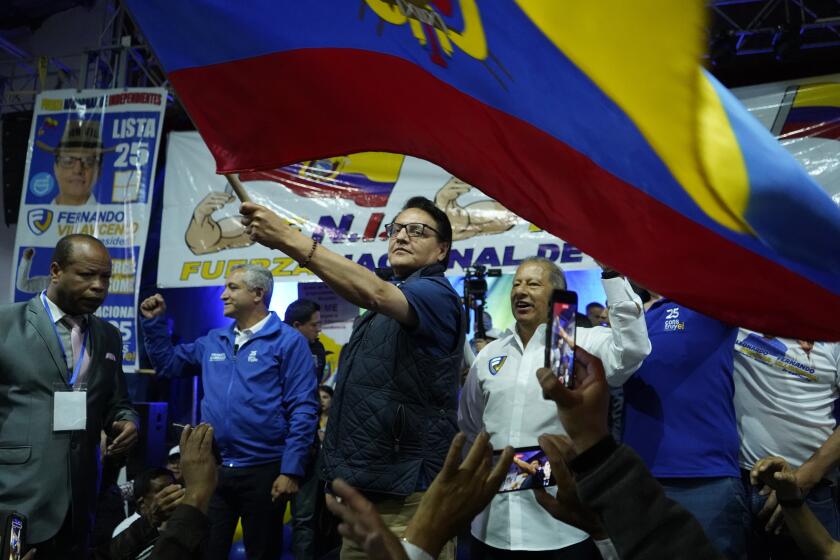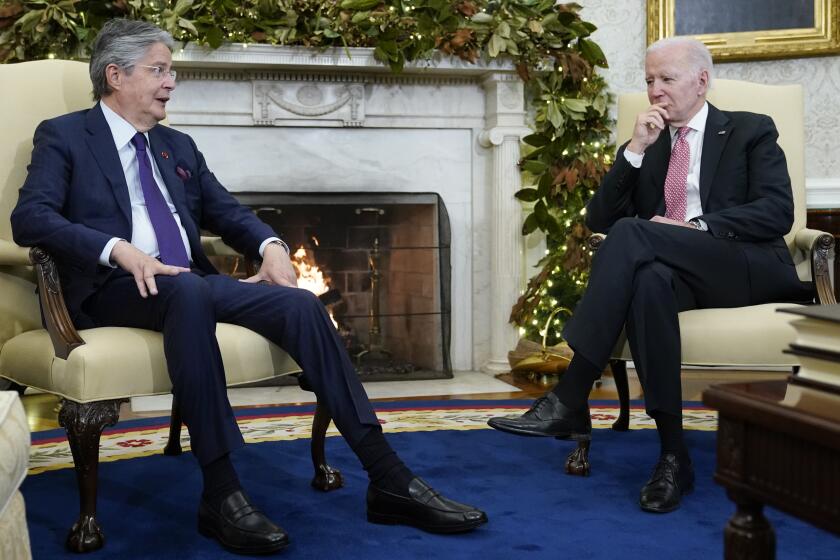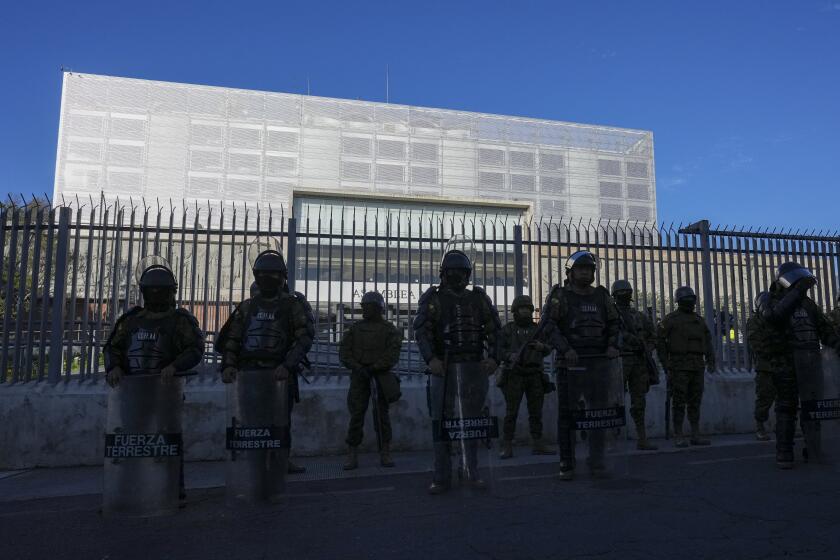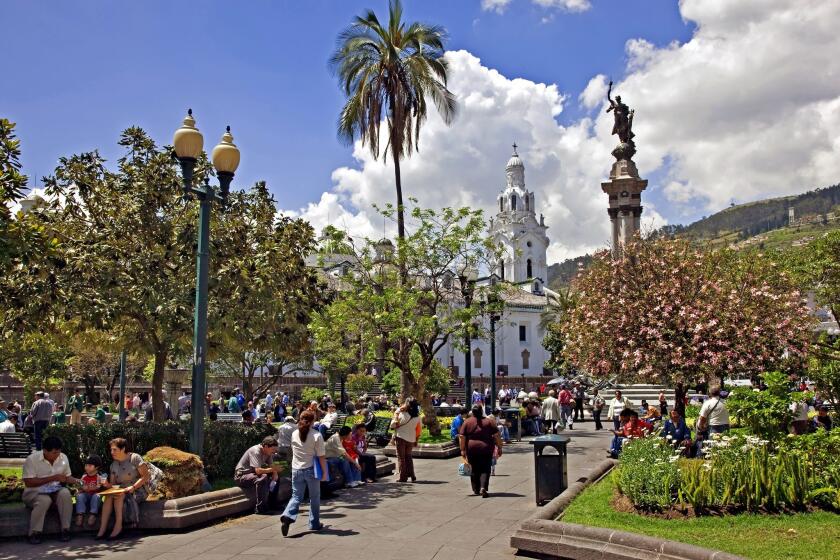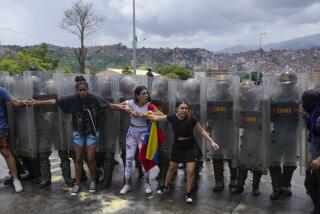Slain Ecuador candidate fearlessly took on drug cartels and corruption
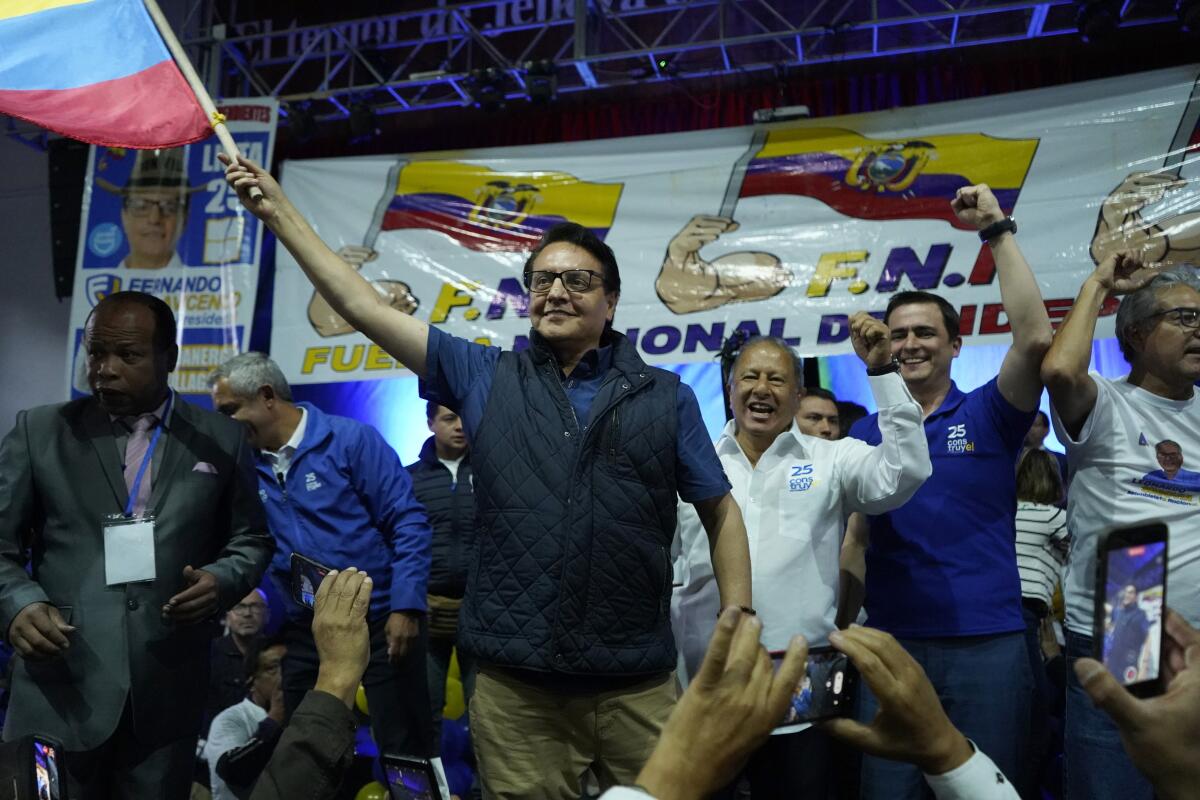
- Share via
QUITO, Ecuador — The Ecuadorean presidential candidate fatally shot at a political rally fearlessly took on his country’s criminal networks and the political elite that he accused of corruption at the hands of organized crime.
Fernando Villavicencio, a journalist before entering politics, for years waged a battle against the forces that he saw transforming Ecuador, including crime seeping into nearly every aspect of life. The quest made some of his country’s most powerful people into his enemies.
Six Colombian men arrested Wednesday in the capital, Quito, will be held for at least a month as Ecuador probes their involvement in the slaying, the country’s national prosecutor’s office said Friday.
A public ceremony to mourn Villavicencio was held Friday in the capital convention center, while a separate funeral service was being held for relatives.
“People need to know that his family’s in danger and we can’t go to such a big event,” the victim’s daughter, Tamia Villavicencio, told reporters outside the cemetery.
The 59-year-old received multiple threats, and he linked some of them to Mexico’s Sinaloa cartel, a powerful drug-trafficking network on the rise in Ecuador. Regardless of the danger, Villavicencio promised in his final speech that he would lock up the “thieves.”
“Here I am showing my face. I’m not scared of them,” Villavicencio told reporters before he was killed.
Fernando Villavicencio was killed by a gunman at a political rally in Quito, the capital of Ecuador, where drug trafficking and violence have surged.
Born in a rural part of Ecuador, Villavicencio moved to Quito, with his family as a teenager. He would study at night and work during the day, he told local newspaper El Universal this month.
Villavicencio began taking on the powerful at 18, when he founded a small newspaper, Prensa Obrera, which focused on workers’ rights, and went on to study journalism at the Central University of Ecuador.
After working at a state-run oil company, he went on to write books and articles for national media about corruption and the environmental damage caused by the petroleum industry.
Among his biggest scoops as a journalist was reporting on a trove of documents that pointed to inflated prices, shoddy workmanship and extravagant kickbacks in some of the country’s largest infrastructure projects, including some built by Brazilian construction giant Odebrecht. The evidence he uncovered was later used to help convict former Vice President Jorge Glas on bribery charges.
Biden administration efforts to find a partner in Latin America ignore Ecuador’s severe problems, congressional critics say.
Villavicencio also wrote about obscure deals in which former President Rafael Correa’s leftist government took billions in loans from state banks in China in exchange for oil shipments.
The oil deals, harshly criticized by Villavicencio, have since been restructured by President Guillermo Lasso to give the OPEC nation more financial breathing room at a time when the dollarized economy has been losing competitiveness to its neighbors, all of which have flexible exchange rates that have helped buoy exports.
For his fearless reporting and whistleblowing, Villavicencio paid a high price.
He was sentenced to 18 years in prison for defaming ex-president Correa but went on the run and sought refuge in the dense jungles of Ecuador’s Indigenous territory.
As he dodged authorities closing in on him, he survived by eating crocodile, bird and monkey meat and dodged police checkpoints by wading through jungles and rivers, according to a 2014 Committee to Protect Journalists profile.
“The president wants me to get down on my knees and apologize,” Villavicencio told CPJ from a safe house, where he was writing a book. “But I will never do that.”
The president disbanded the National Assembly to avoid impeachment. The move bodes ill for the country’s democracy and could return Rafael Correa to power.
In 2017, he fled into exile in Peru. Upon his return home, he began to work in politics, and he could be seen shuttling around Quito with armed bodyguards.
Villavicencio has also filed judicial complaints against high-ranking government officials. The most notorious case, often referred to as “Las Torres,” ended in the prosecution of Comptroller General Pablo Celi on corruption charges.
The anticorruption complaints made Villavicencio “a threat to international criminal organizations,” said Edison Romo, a former military intelligence colonel.
Groups from Mexico and Colombia largely focused on narcotrafficking have increasingly flocked to Ecuador in recent years, leading to an uptick in violence as traffickers use the country’s ports to ship cocaine.
Gunfire is heard in many major cities as rival gangs battle for control, and gangs have recruited children.
The worst violence in decades has left Ecuadoreans reeling and placed critical voices like Villavicencio’s in greater danger.
Yet he continued with his work as a leftist politician and started to serve in 2021 as a deputy in Ecuador’s congress, a representative of the Honesty Alliance. As a legislator, he would regularly denounce energy and oil companies that had contracts with the government.
Villavicencio stayed in that role until Lasso dissolved the legislature in May as he was facing impeachment charges for alleged embezzlement.
Villavicencio then ran as an anticorruption candidate for Ecuador’s presidency for the leftist Build Ecuador Movement. One of eight candidates, Villavicencio spoke often about the rising levels of violence in his country but was not the front-runner in the race.
Despite that, the candidate had received at least three death threats before the shooting and reported them to authorities, resulting in one detention, said Patricio Zuquilanda, Villavicencio’s campaign advisor. His death was met by an outpouring of grief from other candidates, campaign staff, supporters and even Lasso.
“The Ecuadorean people are crying, and Ecuador is mortally wounded,” Zuquilanda said. “Politics cannot lead to the death of any member of society.”
Janetsky reported from Mexico City.
More to Read
Sign up for Essential California
The most important California stories and recommendations in your inbox every morning.
You may occasionally receive promotional content from the Los Angeles Times.
